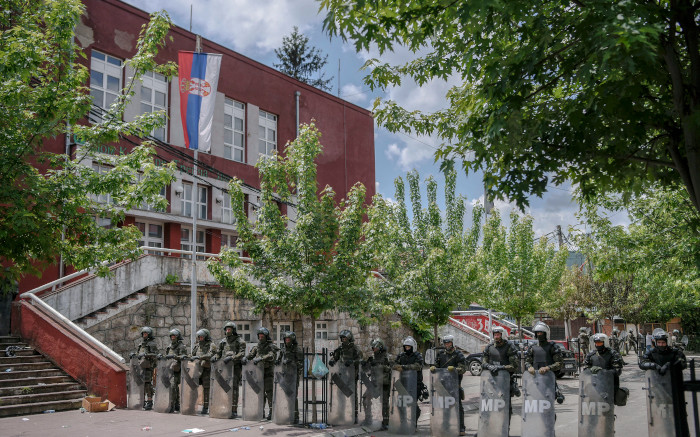ZVECAN – Ethnic Serbs gathered for a fourth consecutive day, albeit in smaller numbers, at the site of clashes this week with NATO-led soldiers in Kosovo, as international pressure mounts on Pristina to diffuse tensions in the volatile region.
Kosovo police urged ethnic Albanians to ignore appeals on social media to march towards the Serb-majority part of the divided southern city of Mitrovica in a bid not to flame the situation further.
Police urged people “to remain calm and not to fall prey to any alleged organisation” and “let institutions… handle the situation professionally”.
In the northern town of Zvecan, some 70 protesters – significantly fewer than crowds seen on previous days – rallied outside the town hall, sealed off with barbed wire and encircled by NATO-led peacekeepers (KFOR) in full riot gear.
A KFOR armoured vehicle barred the building to road traffic, a move requested on Wednesday by a local Serb party after masked protesters smashed windows on two Kosovo police cars in the town centre, injuring an officer.
On Monday, NATO-led peacekeepers armed with shields and batons clashed with protesters throwing rocks, bottles and Molotov cocktails. Thirty peacekeepers and more than 50 demonstrators were injured.
Kosovo’s ethnic Serb minority boycotted April local elections in the north, allowing ethnic Albanians to take control of local councils despite a turnout of less than 3.5 percent.
Many Serbs are demanding the withdrawal of Kosovo special police forces, as well as the ethnic Albanian mayors they do not consider their true representatives.
The United States – Kosovo’s historic ally who championed the former province’s independence from Serbia – criticised the government in Pristina for “sharply and unnecessarily escalated tensions” by installing ethnic Albanian mayors.
French president Emmanuel Macron also said Kosovo authorities bore “responsibility” for the current situation.
Macron and German Chancellor Olaf Scholz are expected to meet Kosovo President Vjosa Osmani and her Serbian counterpart Aleksandar Vucic on Thursday on the sidelines of a summit in Moldova.
Kosovo declared independence from Serbia in 2008, but Belgrade – along with its allies China and Russia – still do not recognise the move, preventing Kosovo from having a seat at the United Nations.
Kosovo is mainly populated by ethnic Albanians, but the Serbs who make up around six percent of the population have remained largely loyal to Belgrade, especially in the north where they are a majority.
